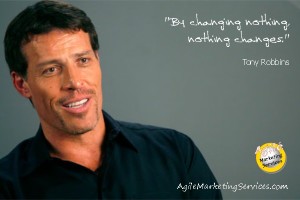 “If everybody is thinking alike then somebody isn’t thinking.” Gen George S Patton
“If everybody is thinking alike then somebody isn’t thinking.” Gen George S Patton
 amsadmin
amsadmin
Quote Robbins 03
“By changing nothing, nothing changes.” Tony Robbins
Launch It! Business Competition
Over the last two Fridays, I was invited to watch SUNY Oswego’s first student business competition. Launch It! was a program started by two students, Jordan Shutts and Eli VanOrman, both members of the SUNY Oswego Enactus group. [Enactus is an international business organization that promotes education and presentation competition. Visit the main website here. I highly recommend it to any college students.]
Agile’ was honored to be asked to participate! So, we decided to award a year’s worth of web hosting to each of the top three teams. I’ll be posting pictures of the winners, plus some information about their business proposals and the team members as I get the information from them. I was very impressed by many of the teams, including some that didn’t win any awards.
Which brings me to the point I told them directly, and which applies to all my clients and folks who read my books: Just because someone else doesn’t single you out for recognition, doesn’t mean you’re not worthy. Keep going! Don’t quit just because nobody stopped to pat you on the back, or because you weren’t awarded money. Keep working at your business for you, and for all those who will benefit from your efforts.
A Year’s Worth Of Social Media Posts
Podcasting Setup
 Here’s a look at my new podcasting setup. Most of it, anyway. My headphones are off to the side, and I don’t have my phone hooked up for recording interviews. But you get the idea.
Here’s a look at my new podcasting setup. Most of it, anyway. My headphones are off to the side, and I don’t have my phone hooked up for recording interviews. But you get the idea.
- CAD c195 mic
- Windscreen
- Neewer mic stand
- HP 17″ i7 notebook running Audacity
- Behringer Xenyx Q802USB board
- Podcast Hotline cord
Success of Others
This domain of thinking is perhaps the biggest area of discrepancy between the successful and the average.
When the average person looks around at the successful people in the world, the first feeling they typically get is one of disgust or jealousy. They will often think “why can’t I have what they have?” or “it’s unfair that there are billionaires when so many people like me are barely scraping together rent.” Nearly everyone at some point has thought one of these two things. The average person may eventually come to hate people who are affluent or successful, which then limits their own ability to grow. On a subconscious level, they are not willing to become that which they hate.
Hate, envy, and disgust are definitely not the dominating emotions of those who achieve massive success in life, and it certainly serves them well. When success-minded people, including those who are still in progress toward their dreams, see the success of others they aren’t thinking about gender/race advantage or why they can’t get ahead. They instead are thinking “what can I learn from this person that I can use in my own journey?” The mindset is very similar to the child who looks up at their parent with pride and says “when I grow up, I want to be just like you!” Such people aren’t looking to condemn the success of others, they are looking for hints. They know that the successful breathe the same air as themselves, and that the successful aren’t necessarily smarter or more gifted either.
The success-minded person will then seek out ways of getting around people who can help them and those that they look up to. They not only speculate about learning from the success of others, they take action to learn from them!
The average person also may believe that the success of others makes it harder to be successful themselves. It’s as if they believe the universe gives out only so many “success tickets” each century. Competition makes it harder to succeed at times, yes, but it can also bring out your best as you ascend to levels of complete domination in your sector. For the most part, you aren’t even going to be competing with many of the major players out there. But when you do, rest assured that because you are a unique human being you bring something novel to the table. The success-minded all know this. They don’t believe the best possible product is out there on the market until they themselves provide it in a way only they can. There is an abundance of money and success out there that you can have. However in order to get it, you need to transcend the mundane and average mindset.
Making the Shift
In order to go from loathing the success of others to looking to them for ideas and inspiration, you need to change your thinking a little bit each day. Sure, you can always try to “will” yourself to be thankful for all these people and try reconditioning your mind to accept that the successful aren’t bad people, but there is a far easier way.
Take action! Hop on Youtube and start looking for people you “vibe with” who have achieved a lot of success doing what you are attempting yourself. See if they have any “how to”-type videos online and watch a million of them. The old saying “familiarity breeds contempt” has been proven false by psychological research years ago. In fact quite the opposite is true. The more time you spend around someone the more you come to appreciate them. By watching “how-to” videos or asking advice from people who have achieved their goals you will learn that they are not all evil (some are, don’t get me wrong), and they want you to succeed as well. You will start to see the actual human being behind all the fame and glory after a while. More importantly, you will start to relate with them. There will come an “aha!” moment where you see that if they can do it so can you. It’s really not enough to be told that fact, you have to feel it in your bones for yourself. The best way to make that happen is by getting around the people you admire in any way you can for a sufficient amount of time. Once you’ve had this experience, there is no going back to hating the success of others. It’s just not possible.
 Tyler Bennett is a writer, entrepreneur, and graduate student in mathematics who has a passion for helping students get the most out of their education and their lives as a whole. He has authored several books including The Art of Habit Building and The College Handbook They Never Gave You under the pen name Dan Stevens, and is the primary writer for the website TheCollegeSuccessGuide.net . Tyler is married and has four cats.
Tyler Bennett is a writer, entrepreneur, and graduate student in mathematics who has a passion for helping students get the most out of their education and their lives as a whole. He has authored several books including The Art of Habit Building and The College Handbook They Never Gave You under the pen name Dan Stevens, and is the primary writer for the website TheCollegeSuccessGuide.net . Tyler is married and has four cats.
Criticism
You may be thinking “this guy’s gonna tell me that successful people don’t take anything personally.” You’re right! But there’s more to it than that; quite a bit more in fact. One thing is certain: when you start applying focused and determined effort on a regular basis as we discussed in the last few posts, you’re going to get some criticism in some form or another. Now this can come in many forms, naturally. There’s the obvious form, which is direct insults hurled at you or your brand, or people telling you how you should run your life/business differently. But then there’s a less obvious form, and it usually comes disguised as good intentions. Ever hear “you work so hard! You really should take a break every now and then. It’s good for you!” or “Running a business is really stressful!”? While the person using this form of criticism (telling you how to do things differently) is likely trying to help you, they are not necessarily thinking about helping you reach your goals. If you need to rest, your body will force it upon you. This type of criticism is what some would call “nay-saying”. Nay-saying is basically any verbiage that tries to distract you from what you are trying to achieve, and as mentioned before, it is masked by kindness most often.
We all experience criticism one way or another on a regular basis. It comes as a part of being human and a unique human at that. But how you handle any form of criticism can easily be a determining factor on how much success you achieve.
So how do Average Joe and Mundane Jane deal with criticism and nay-saying? Well for one, they often will listen intently to what the caring nay-sayers are preaching at them. If someone tells them they are working too hard, they tend to agree. They will heed all the warnings they hear and start to take it easy when they should be working much harder. For the average person who listens to this veiled criticism, it becomes increasingly difficult to make any real progress or lasting change. Nearly everyone has a desire to feel wanted, appreciated, and accepted by their peers and family, but by succumbing to that desire too often the average Joe/Jane severely limits their own growth potential.
This isn’t even taking into account actual, harsher forms of criticism. When the average person hears harsh criticism, they tend to take it personally and feel it deep within their bones to some extent. Then the little voice inside their head repeats this criticism over and over until it sticks. Then any time they set out to accomplish something the internal critic is at the ready with “you shouldn’t do that! Someone might hate you for it!” What’s worse than listening to other people’s criticisms but having to listen to your mind’s criticisms, especially when your mind controls your creative faculties, your drive, and determination? The average Joe/Jane loves their internal critic, whether or not they are willing to admit it.
The success-minded, on the other hand, have an entirely different perspective when it comes to criticism. To put succinctly, in the words of Robert Downey Jr, “Smile, nod, agree, and do whatever the f*** you were going to do anyway.” All successful people know beyond any shadow of doubt that in order to go above normality they will hear from all the critics who are trying to hold them down and keep them average. Same goes for nay-sayers. Successful people do not listen to this form of criticism whatsoever! They just keep the path that they know and believe in.
There is a form of criticism that successful people do listen to, but such criticism only applies to that which they produce as a product or service. Anyone who runs a business knows that customer satisfaction is second only to customer acquisition, and that the only way to ensure that a customer is satisfied is by listening to their criticism/complaints. However when listening to a customer’s criticism they are not likely to take any of it personally even if they created the product with their own two hands. Successful people listen to this form of criticism and use it as a means of understanding their market and their customers better. While at first it may seem that someone’s complaints about a product or service is a negative thing that might result in the loss of business, the success-minded know that they can leverage that critique and use it to secure and satisfy more customers later by remedying the problem.
Making the Shift
You are always going to hear criticism of all kinds from all kinds of people. You have to always physically hear it. It is entirely up to you, the listener, how to respond to it and determine its legitimacy. No matter how you decide to respond to someone’s criticism, you must do so effectively and swiftly. Failure to do so will either slow you down or cause you to lose business. So how can one learn to do that?
The “Three Boxes” Method
In your mind create three boxes labeled “Constructive Advice”, “Garbage Advice/Whining”, and “Customer Complaints.” We all know criticism when we hear it, so the idea is to take that criticism and throw it into one of these boxes for storage so we don’t needlessly let the criticism run around our minds all day.
Here’s what goes in each box.
“Constructive Advice” Box:
Literally any suggestion, from people who know what they are talking about, on how you can improve what it is you are doing and therefore reach your targets faster. This does not include advice from people who have not been where you want to go in life. If your mother/father has never made a million dollars in their life would you honestly listen to their advice on how to become a millionaire? Probably not. Yes, I know they are your parents and you should respect them and what they have to say, but they can’t help you reach that goal as much as a billionaire could. However, as a caveat, there are times where people without experience share great ideas with you. If you think that what you are hearing is good and can help you reach your goals then store that input in the “Constructive Advice” box.
You will know constructive advice when you hear it. If you can immediately take that advice you heard and connect it with how it helps you reach your goals, it goes in the “Constructive Advice” box. The more advice you hear of this type the better off you will be. As such you should make a point to surround yourself with like-minded people, or those who have done what you are attempting. They can and they will help you. Heck, just being around them for long enough will change the way you think! “Location, location, location” applies not just to the locale of your business venue, but also to where you find yourself as well. Bad location = bad results. Good location = good results.
“Garbage Advice/Whining” Box
This box should be shaped like a garbage can. Anything that goes into this box is literally trash and should not take up any mental real estate. The moment you hear it, just let it pass right through from one ear to the other. The types of things you put in this box will include people telling you to slow down, take it easy, or take a day off when you know that you don’t need to do so. It will also include, as I mentioned before, advice you get from people who don’t have the experience to back it up.
Whining that you get from peers, coworkers, or employees can also go in this box for the most part. If someone says “you’re too assertive!” that is whining. If someone says “you expect too much from your team” when you are working harder and longer than your team is, that is whining. Basically, what goes into this box is criticism that cannot help you reach your goals faster or things that will ultimately slow you down.
“Customer Complaints” Box
Everyone who is employed on planet earth has customers. I’m not necessarily talking about the customers you buy your business’s products or services (while those certainly apply as well). Your customers are anyone who consume or compensate you in some way for your services or products. These include your kids, your spouse, and your boss. Your family always deserves a certain amount of your time, attention, and affection, so if you hear criticism on these fronts you should store it in the “Customer Complaints” box. If your boss ever critiques your work or what you produce you should always take such under advisement. Never, ever ignore your customers. If you can keep them happy then they will make you happy.
All items filed in this box need to be dealt with in some fashion. While you may not need to deal with any customer issues the moment you receive them, all customer complaints should be handled swiftly and effectively. You must find a way to ensure that they are satisfied with the level of quality you produce, while at the same time not forgoing your own goals. There is always a solution to these dilemmas, but it is entirely up to you to find it.
Using the System in General
In order to use this three-box filing system for the criticism you receive in your life, you must make a concerted effort to place each critique in its box quickly. If it goes un-stored, it will float around your mind like a bunch of old papers floating around your work desk. The first and the last box are “deal with later” boxes. Those items should never be neglected and should always be acted on as swiftly as humanly possible. The second box on the other hand should always remain empty. The moment you hear a critique that gets filed in the “Garbage Advice/Whining” box try visualizing that comment burning away into nothing. Those critiques have no business cluttering your mind whatsoever.
With practice you will be able to handle criticism as well as the most successful people in our culture. While they tend to do this filing automatically, you will be doing the same in the not too distant future.
 Tyler Bennett is a writer, entrepreneur, and graduate student in mathematics who has a passion for helping students get the most out of their education and their lives as a whole. He has authored several books including The Art of Habit Building and The College Handbook They Never Gave You under the pen name Dan Stevens, and is the primary writer for the website TheCollegeSuccessGuide.net . Tyler is married and has four cats.
Tyler Bennett is a writer, entrepreneur, and graduate student in mathematics who has a passion for helping students get the most out of their education and their lives as a whole. He has authored several books including The Art of Habit Building and The College Handbook They Never Gave You under the pen name Dan Stevens, and is the primary writer for the website TheCollegeSuccessGuide.net . Tyler is married and has four cats.




